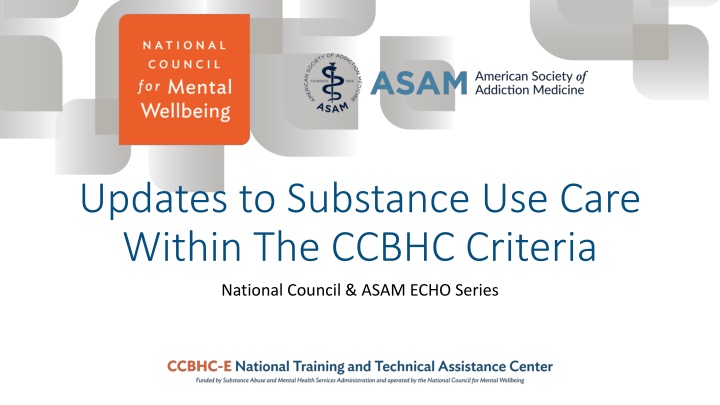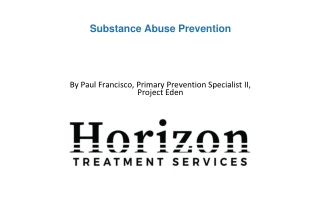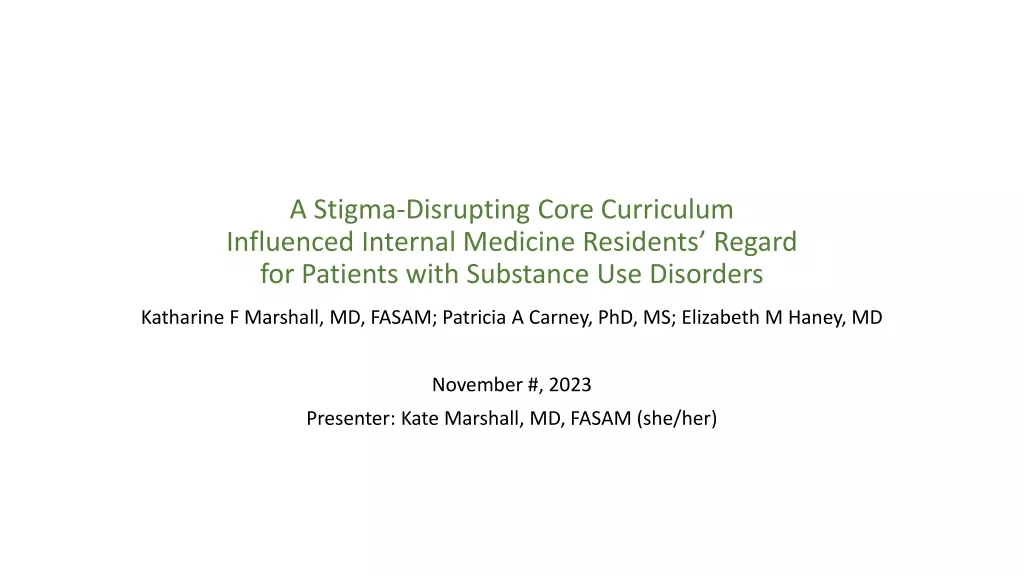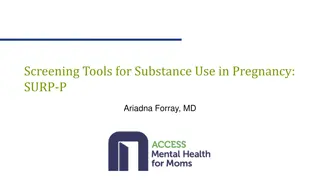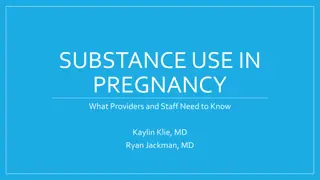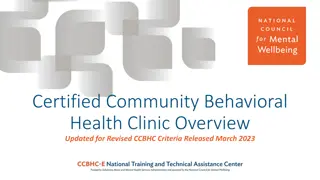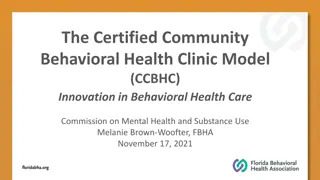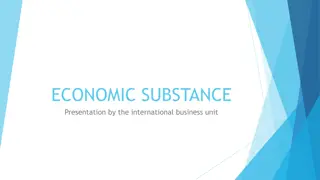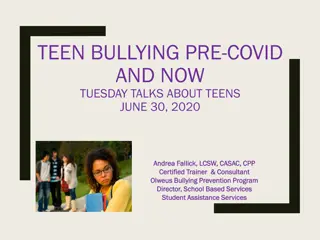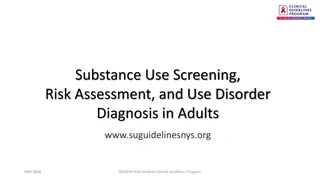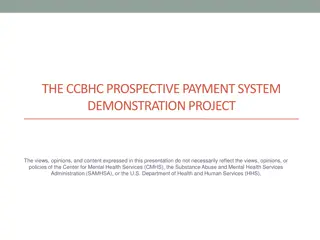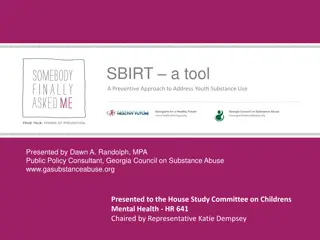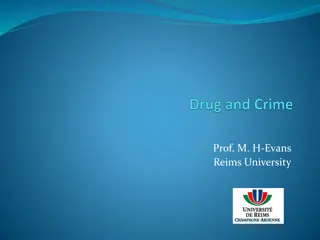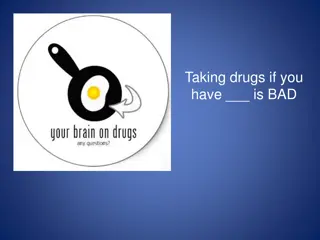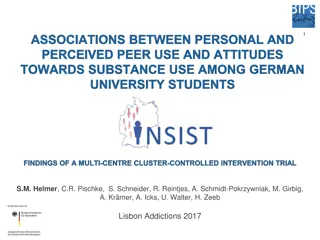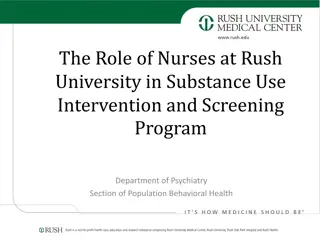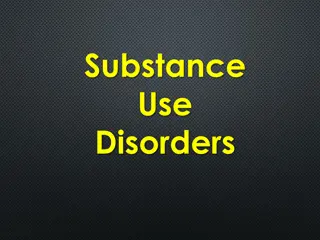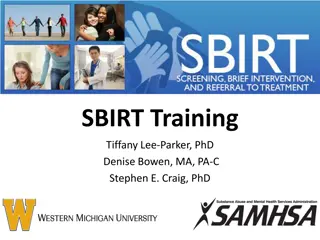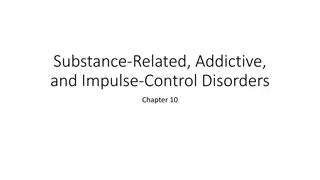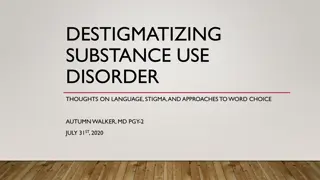Updates on Substance Use Care Within the CCBHC Criteria
This series delves into the updates related to substance use care within the Certified Community Behavioral Health Clinic (CCBHC) criteria. It explores key considerations and best practices, offering insights to enhance service delivery and support individuals seeking treatment for substance use disorders.
Download Presentation

Please find below an Image/Link to download the presentation.
The content on the website is provided AS IS for your information and personal use only. It may not be sold, licensed, or shared on other websites without obtaining consent from the author.If you encounter any issues during the download, it is possible that the publisher has removed the file from their server.
You are allowed to download the files provided on this website for personal or commercial use, subject to the condition that they are used lawfully. All files are the property of their respective owners.
The content on the website is provided AS IS for your information and personal use only. It may not be sold, licensed, or shared on other websites without obtaining consent from the author.
E N D
Presentation Transcript
Updates to Substance Use Care Within The CCBHC Criteria National Council & ASAM ECHO Series
This publication was made possible by Grant No. 1H79SM085856 from the Substance Abuse and Mental Health Services Administration (SAMHSA). Its contents are solely the responsibility of the authors and do not necessarily represent the official views, opinions or policies of SAMHSA, or the U.S. Department of Health and Human Services (HHS).
Education Collaboration American Society of Addiction Medicine National Council for Mental Wellbeing The National Council for Mental Wellbeing is a membership organization that drives policy and social change on behalf of more than 3,400 mental health and substance use treatment organizations and the more than 10 million children, adults and families they serve. National Council advocates for policies to ensure equitable access to high-quality services, builds organizational capacity, and promotes mental wellbeing in healthcare. ASAM, founded in 1954, is a professional medical society representing over 7,000 physicians, clinicians and associated professionals in the field of addiction medicine. ASAM is dedicated to increasing access and improving the quality of addiction treatment, educating physicians and the public, supporting research and prevention, and promoting the appropriate role of physicians in the care of patients with addiction.
CCBHC ECHO Series Session #1 Updated CCBHC Criteria Session #2 Session #3 Co-Occurring Disorders Stimulant Use Disorder 1 April 23, 2024 3:30 pm 5:00 pm ET May 28, 2024 3:30 pm 5:00 pm ET March 26, 2024 3:30 pm 5:00 pm ET Session #4 Session #5 Opioid Use Disorder Session #6 Alcohol Use Disorder Cannabis Use Disorder June 25, 2024 3:30 pm 5:00 pm ET July 23, 2024 3:30 pm 5:00 pm ET August 27, 2024 3:30 pm 5:00 pm ET
ECHO Series Faculty Angela L. Colistra, PhD, LPC, CAADC, CCS Lead ECHO Facilitator Jane King, PsyD, LP Speaker Jennifer Leggett, LPC, LADC, CPRSS CCBHC Speaker Trina Fullard, MA, CCS, LCAS Faculty No relavant financial relationships to disclose. No relavant financial relationships to disclose. No relavant financial relationships to disclose. No relavant financial relationships to disclose.
Agenda Welcome & Introductions (15 Min) Didactic Presentation (30 Min) Didactic Presentation Q&A (15 Min) Case Presentation #1 (20 Min) Case Presentation #2 (20 Min) Closing Announcements (5 Min)
Recording Notice By joining this TeleECHO Session, you consent to being recorded for educational and quality improvement purposes. Your participation is appreciated. For questions or concerns, email education@asam.org.
Helpful Tips Mute microphone when you are not speaking. Position webcam effectively. Test both audio and video. Communicate clearly during clinic. Speak clearly. During discussion, use chat function only if audio is not working properly.
Please Turn On Your Camera To promote face-to-face mentorship and the sharing of knowledge, please turn on your device's camera during the ECHO session if possible.
Introductions In the interest of preserving time for presentations, please briefly state the following when called upon the session facilitator: 1. Full Name 2. Location 3. Addiction Medicine Role If your mic is not functioning, please type your introductions in the Zoom chat box.
The language we choose shapes the way we treat our patients Instead of: You can say . addict, junkie, substance abuser Person with a substance use disorder Addicted baby Baby experiencing substance withdrawal Avoid Use of Stigmatizing Language Alcoholic Person with alcohol use disorder Dirty vs clean urine Positive or negative, detected or not detected Binge Heavy drinking episode Detoxification Withdrawal management, withdrawal Relapse Use, return to use, recurrence of symptoms or disorder substance abuse Use (or specify low-risk or unhealthy substance use) Substitution, replacement, Medication assisted treatment Opioid agonist treatment, medication treatment Saitz, R., Miller, S. C., Fiellin, D. A., & Rosenthal, R. N. (2020). Recommended Use of Terminology in Addiction Medicine.
Live Virtual Session: Ground Rules 1. We share cases to give time to process new information. Please participate! 2. Everyone s experiences differ: Assume the best intentions. 3. Monitor your participation: Everyone is accountable. 4. If someone says something that is not your understanding of the evidence.
Updates to Substance Use Care within the CCBHC Model
Learning Objectives By the end of this session, participants will: Develop basic understand of the CCBHC model and funding mechanisms to support implementation Increase knowledge and understanding of the substance use service and implementation requirements within the CCBHC criteria Identify considerations and strategies for substance use as it pertains to their CCBHC implementation
What is a Certified Community Behavioral Health Clinic (CCBHC)? CCBHC is a model of care that aims to improve service quality and accessibility. CCBHCs are required to serve anyone who requests care for mental health or substance use, regardless of their ability to pay, place of residence or age including developmentally appropriate care for children and youth. CCBHCs do the following: Coordinate care with other behavioral health, physical health, and social services systems in the community. Offer the full array of CCBHC-required mental health, substance use and primary care screening services. Provide integrated, evidence-based, trauma- informed, recovery- oriented and person- and family-centered care.
CCBHC Funding Pathways There are currently three funding pathways for CCBHCs: 1. Section 223 CCBHC Demonstration Program: This includes states awarded the opportunity to participate in the Section 223 CCBHC Demonstration Program established in 2017. These states establish a process for state certification for eligible clinics utilizing the federal CCBHC criteria, and clinics receive a Prospective Payment System (PPS) rate. 2. Independent State Medicaid-funded CCBHC Programs: This includes states that have enacted the CCBHC program through a Medicaid State Plan Amendment or Waiver with approval from The Centers for Medicare & Medicaid Services (CMS). These states establish state-specific eligibility criteria and a process for certification of eligible clinics. 3. SAMHSA-administered CCBHC Grant Program: SAMHSA awards grant funding directly to clinics to support adoption and implementation of the CCBHC model. Receiving grant funding is not the same as certification. Grant recipients that have not received state certification either because the state does not certify CCBHCs or because the organization is not an entity that has received state certification must submit an attestation to SAMHSA describing how they are meeting the federal CCBHC criteria requirements.
Focus of CCBHC Criteria The Protecting Access To Medicare Act of 2014 (PAMA) makes clear that, regardless of condition, CCBHCs must provide services to anyone seeking help for a mental health or substance use condition, regardless of their place of residence, ability to pay, or age. This includes any individual with a mental or substance use disorder who seeks care, including: Those with serious mental illness (SMI) Substance use disorder (SUD) including opioid use disorder and severe SUD Children and adolescents with serious emotional disturbance (SED) Individuals with co-occurring mental and substance disorders (COD) Individuals experiencing a mental health or substance use-related crisis
CCBHC Criteria Program Requirements 1: Staffing To view the full criteria, visit Certified Community Behavioral Health Clinic (CCBHC) Certification Criteria Updated March 2023 (samhsa.gov) 2: Availability and Accessibility of Services 3: Care Coordination 4: Scope of Services 5: Quality and Other Reporting 6: Organizational Authority, Governance and Accreditation 30-minute videos overviewing the model: On-Demand Modules/Lessons - National Council for Mental Wellbeing (thenationalcouncil.org)
Criteria 1.A: General Staffing Requirements A community needs assessment and staffing plan that is responsive to the community needs assessment are completed and documented for certification and/or attestation. Both the needs assessment and staffing plan will be updated no less frequently than every three years. Update: Clarifies that if the CCBHC cannot prescribe Methadone they should refer people who need Methadone to an OTP If a CCBHC does not have the ability to prescribe methadone for the treatment of opioid use disorder directly, it shall refer to an OTP (if any exist in the CCBHC service area) and provide care coordination to ensure access to methadone. The CCBHC must have staff, either employed or under contract, who are licensed or certified substance use treatment counselors or specialists. If the Medical Director is not experienced with the treatment of substance use disorders, the CCBHC must have experienced addiction medicine physicians or specialists on staff, or arrangements that ensure access to consultation on addiction medicine for the Medical Director and clinical staff.
Criteria 1.B: Licensure and Credentialing of Providers CCBHC staff must include: Update: If the Medical Director is not experienced with the treatment of substance use disorders, the CCBHC must have experienced addiction medicine physicians or specialists on staff, or arrangements that ensure access to consultation on addiction medicine for the Medical Director and clinical staff. o A medically trained behavioral health care provider, either employed or available through formal arrangement, who can prescribe and manage medications independently under state law, including buprenorphine and other FDA-approved medications used to treat opioid, alcohol and tobacco use disorders. o Staff, either employed or under contract, who are licensed or certified substance use treatment counselors or specialists. o Staff with expertise in addressing trauma and promoting the recovery of children and adolescents with serious emotional disturbance and adults with serious mental illness.
Criteria 1.C: Cultural Competence and Other Training At orientation and annually thereafter, the CCBHC must provide training on risk assessment, suicide and overdose prevention and response and the roles of family and peer staff. Training shall be aligned with the National Standards for Culturally and Linguistically Appropriate Services (CLAS) 6 to advance health equity, improve quality of services and eliminate disparities. To the extent active-duty military or veterans are being served, such training must also include information related to military culture.
Care Coordination 3.C: Partnerships Required Partnerships Department of Veterans Affairs medical centers, independent outpatient clinics, drop-in centers and other facilities Federally qualified health centers (FQHCs)/Rural Health Centers/primary care Hospitals/Emergency Departments (EDs) Inpatient acute care hospitals and hospital outpatient clinics Inpatient psychiatric facilities, OTP services, substance use detox, post-detox step-down services and residential programs Other community or regional services, supports and providers, including schools, child welfare agencies, juvenile and criminal justice agencies and facilities, Indian Health Service youth regional treatment centers, state-licensed and nationally accredited child-placing agencies for therapeutic foster care service and other social and human services Additional Recommended Partnerships Other specialty and social and human services providers Indian Health Service and tribal programs Suicide and crisis hotlines and warmlines Shelters and housing agencies Employment services systems Peer-operated programs Developmental disabilities agencies and resource centers Substance use prevention and harm reduction programs Programs and services for families with young children *Any health care organization or social service provider supporting CCBHC clients.
Scope of Services 4.A-4.K CCBHC The CCBHC organization will deliver the majority of services under the CCBHC umbrella directly rather than through DCOs (i.e., a majority of total service volume delivered across the nine required services). Crisis Services Screening, Assessment and Diagnosis Person- centered and Family- centered Treatment Planning Outpatient Mental Health and Substance Use Services Primary Care Screening and Monitoring Targeted Case Management Services Peer Supports and Family/ Caregiver Supports Community Care for Uniformed Service Members and Veterans Psychiatric Rehabilitation Services
Scope of Services 4.C: Crisis Behavioral Health Services Three required crisis services: o Emergency crisis intervention services: Provides or coordinates with telephonic, text and chat crisis intervention call centers that meet 988 Suicide & Crisis Lifeline standards with protocols established to track referrals made from the call center. o 24-hour mobile crisis teams: Provides mobile crisis 24/7 to adults, children, youth and families. Teams are expected to arrive in person within one hour (2 hours in rural and frontier settings), not to exceed 3 hours. Telehealth/telemedicine may be used. o Crisis receiving/stabilization: Provides urgent care/walk-in services. Walk-in hours are informed by the community needs assessment and include evening hours that are publicly posted. The CCBHC may consider supporting or coordinating with peer-run crisis respite programs. national-guidelines-for-behavioral-health-crisis-care-02242020.pdf (samhsa.gov)
Scope of Services 4.C: Crisis Behavioral Health Services - Detail Crisis receiving/stabilization: The CCBHC provides crisis receiving/stabilization services that must include at minimum, urgent care/walk-in mental health and substance use disorder services for voluntary individuals. Urgent care/walk-in services that identify the individual s immediate needs, de- escalate the crisis, and connect them to a safe and least-restrictive setting for ongoing care (including care provided by the CCBHC). Walk-in hours are informed by the community needs assessment and include evening hours that are publicly posted. Services provided must include suicide prevention and intervention, and services capable of addressing crises related to substance use including the risk of drug and alcohol related overdose and support following a non-fatal overdose after the individual is medically stable. Overdose prevention activities must include ensuring access to naloxone for overdose reversal to individuals who are at risk of opioid overdose, and as appropriate, to their family members.
Initial Evaluation Data Elements 1. 2. 3. Preliminary diagnoses The source of referral The reason for seeking care, as stated by the person receiving services Identification of the immediate clinical care needs related to the diagnosis for mental and substance use disorders of the person receiving services A list of all current prescriptions and over-the counter medications, herbal remedies, and dietary supplements and the indication for any medications A summary of previous mental health and substance use disorder treatments with a focus on which treatments helped and were not helpful The use of any alcohol and/or other drugs the person receiving services may be taking and indication for any current medications 8. An assessment of whether the person receiving services is a risk to self or to others, including suicide risk factors An assessment of whether the person receiving services has other concerns for their safety, such as intimate partner violence 10. Assessment of need for medical care (with referral and follow-up as required) 11. A determination of whether the person presently is, or ever has been, a member of the U.S. Armed Services 12. For children and youth, whether they have system involvement (such as child welfare and juvenile justice) 9. 4. 5. 6. 7.
Comprehensive Evaluation Data Elements 1. 2. 3. Reasons for seeking services at the CCBHC An overview of relevant social supports A description of cultural and environmental factors that may affect the treatment plan of the person receiving services Pregnancy and/or parenting status. Behavioral health history, including trauma history and previous therapeutic interventions and hospitalizations Relevant medical history and major health conditions that impact current psychological status A medication list including prescriptions, over-the counter medications, herbal remedies, dietary supplements, and other treatments or medications of the person receiving services 8. Current mental status, mental health and substance use disorders Basic cognitive screening for cognitive impairment 10. Assessment of imminent risk, including suicide risk, withdrawal and overdose risk, danger to self or others, urgent or critical medical conditions 11. The strengths, goals, preferences, of the person receiving services 12. Assessment of any relevant social service needs of the person receiving services 13. An assessment of need for a physical exam 14. Preferences for telehealth/telemedicine 9. 4. 5. 6. 7.
Additional Assessment and Brief Intervention If screening identifies unsafe substance use including problematic alcohol or other substance use, the CCBHC conducts a brief intervention and the person receiving services is provided a full assessment and treatment, if appropriate within the level of care of the CCBHC or referred to a more appropriate level of care. If the screening identifies more immediate threats to the safety of the person receiving services, the CCBHC will take appropriate action.
Scope of Services 4.E: Person-centered and Family-centered Treatment Planning The CCBHC directly, or through a DCO, provides person- and family-centered treatment planning, including, but not limited to, risk assessment and crisis planning. The CCBHC develops an individualized and comprehensive treatment plan based on: o Collaboration (shared decision-making is the preferred model) with the person receiving services, their family and family/caregivers or legal guardians of youth and children that includes the person s goals and preferences. o The initial evaluation, comprehensive evaluation and ongoing screening and assessment. o The person s needs, strengths, abilities, preferences and goals. o The person s health record and any advance directives related to treatment and crisis planning.
Scope of Services 4.F: Outpatient Mental Health and Substance Use Services New in 2023 The CCBHC directly, or through a DCO, provides outpatient behavioral health care, including psychopharmacological treatment using evidence-based services and best practices for treating mental health and substance use disorders (SUDs) across the lifespan. SUD treatment and services shall be provided as described in the American Society of Addiction Medicine (ASAM) Levels 1 and 2.1 and include treatment of tobacco use disorders. The CCBHC or DCO makes specialized, more intensive services or traditional practices/treatments available through referral or through use of telehealth. The CCBHC is strongly encouraged to use motivational techniques and harm reduction strategies to promote safety and/or reduce substance use. Treatments are provided that are appropriate for the phase of life and development of the person receiving services, specifically considering what is appropriate for children, adolescents, transition-age youth and older adults as distinct groups for whom life stage and functioning may affect treatment.
Quality and Other Reporting 5.B: CQI Plan In order to maintain a continuous focus on quality improvement, the CCBHC develops, implements and maintains an effective, CCBHC-wide continuous quality improvement (CQI) plan for the services provided. o Establishes a critical review process to review CQI outcomes and implement changes to staffing, services and availability that will improve the quality and timeliness of services. o Medical Director is involved in the aspects of the CQI plan that apply to the quality of the medical components of care, including coordination and integration with primary care. The CQI plan is to be developed by the CCBHC and addresses how the CCBHC will review known significant events including, at a minimum: (1) deaths by suicide or suicide attempts of people receiving services, (2) fatal and non-fatal overdoses, (3) all-cause mortality among people receiving CCBHC services, (4) 30-day hospital readmissions for psychiatric or substance use reasons and (5) such other events the state or applicable accreditation bodies may deem appropriate for examination and remediation as part of a CQI plan.
Development Considerations Although SAMHSA grants are incredibly helpful for starting a CCBHC, receiving a PPS through Medicaid can give more sustainable and flexible funding opportunities for innovation Start early with making sure your CCBHC has a buprenorphine prescriber on staff and the ability to provide MAT Make sure your community needs assessment is looking at gaps in SUD care delivery Cross train your existing MH and SU care staff to prepare for integration Build partnerships with residential detox, withdrawal management and SU care in your community Train your staff on person- and family-centered care Make sure your crisis services, or the state-sanctioned crisis service provider in your area, manages substance crises as well as MH crises Assess for medication needs immediately to determine risk of withdrawal symptoms Begin to collect Naloxone and build internal expertise about overdose prevention Research EBPs for integrated and SUD-only care and plan for training and supervision Ensure that people receiving services are deeply involved in planning for SU care within the CCBHC
References National Council Success Center: CCBHC Success Center - National Council for Mental Wellbeing (thenationalcouncil.org) SAMHSA CCBHC Criteria: Certified Community Behavioral Health Clinic (CCBHC) Certification Criteria Updated March 2023 (samhsa.gov)
Knowledge Check 1. The CCBHC criteria requires that clinics provide care for SUD including: Gambling addiction Social Media addiction Opioid Use Disorder Diet coke addiction
Knowledge Check 2. The CCBHC criteria requires that assessment and treatment planning for SUD care be: Aligned with MH care Integrated with MH care and care coordination Completely separate from MH care Hidden from staff who are not licensed in SU care
Knowledge Check 3. CCBHC staff must include: Primary care physicians Kindergarten teachers Medically trained prescribers of buprenorphine School social workers
Knowledge Check 4. CCBHCs must provide mobile crisis services that: Cover mental health crises only Include residential detox/withdrawal management services Provide both mental health and substance use related crisis care Is only provided within the clinic
Knowledge Check 5. CCBHCs must provide the following substance use services: Residential SU treatment Inpatient SU treatment Residential withdrawal management ASAM levels 1.0 and 2.1 outpatient levels of care
Complete Evaluation Please follow the steps below to claim credits: 1. Go to www.asam.org 2. On the top right part of the screen, click on Login. 3. Seach for the course Updated CCBHC Criteria March 26, 2024, 3:30 PM 5:00 PM ET 4. Click Complete Post Test to answer multiple choice questions. 5. Click Complete Evaluation to provide valuable activity feedback. 6. Click the button Claim Medical Credits in the box titled Claim Credits & Certificate. Choose the type of credit and click submit. Click the button View/Print Certificate to save or print your certificate. You can view/print your certificate at any time by visiting the ASAM e-Learning Center, clicking Dashboard, and clicking Transcript/Achievements.
Interested in Presenting a Case? Have a patient or clinical system question you need assistance with? Contact Kendra Peterson atkpeterson@asam.org or via Zoom chat Complete the Case Presentation Form and submit one week before the session Present at an upcoming session
Save the Date! CCBHC ECHO Series Session #1 Updated CCBHC Criteria Session #2 Session #3 Co-Occurring Disorders Stimulant Use Disorder 1 April 23, 2024 3:30 pm 5:00 pm ET May 28, 2024 3:30 pm 5:00 pm ET March 26, 2024 3:30 pm 5:00 pm ET Session #4 Session #5 Opioid Use Disorder Session #6 Alcohol Use Disorder Cannabis Use Disorder June 25, 2024 3:30 pm 5:00 pm ET July 23, 2024 3:30 pm 5:00 pm ET August 27, 2024 3:30 pm 5:00 pm ET
